Only black / grey wedges with embossed PRINZ marking guarantee quality and appropriate mechanical and chemical resistance.
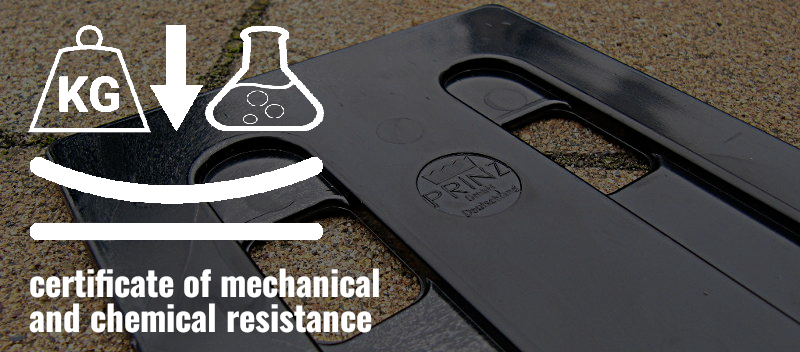
The method of undercutting walls and laying horizontal insulation, which has been proven for over 40 years throughout Europe and is used in existing, damp buildings, is also very popular in Poland. Since 1996, PRINZ Polska has been providing – in cooperation with partner companies – such services, also offering equipment, insulation materials, full service and “know-how”.
Effective waterproofing of buildings depends not only on professional execution of the work, but also on the quality of the insulation materials. PRINZ offers excellent quality insulation plates that do not degrade, wedges that prevent the undercut building from settling and concrete additives that cause non-shrinkage setting.
We offer modern and reliable insulation solutions. We use HDPE polyethylene foils and glass fibre reinforced polyester foils, which are characterised by excellent anti-moisture properties.
HDPE polyethylene foils (2 mm thickness) are extremely durable and reliable insulation materials. They are characterized by high mechanical and chemical resistance, effectively protecting foundations and walls from moisture. They are ideal for building renovations and modern construction projects. Flexibility and ease of processing enable easy bending of the foil and thus the possibility of changing the height of the gap – when cutting in one level is not technically possible.
Polyester foil reinforced with glass fiber (1,2 mm thickness) is a durable material that is widely used in construction. Available in various versions, it effectively protects against moisture and other external factors, ensuring reliability and durability of insulation. Mainly used for waterproofing of stone walls, when cutting with a diamond wire.
HDPE polyethylenfoil, 2mm thickness
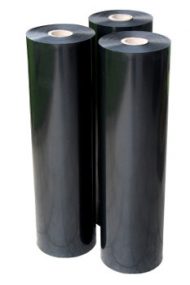
- black HDPE polyethylenfoil, 2mm thickness, roll 25m2, width 1m
- robust insulating plates providing appropriate mechanical and chemical resistance – do not crack when driving wedges
- cutting using a robust knife
- insulating plates do not move when driving wedges
Polyesterfoil reinforced with glass fibre, 1,2mm thickness
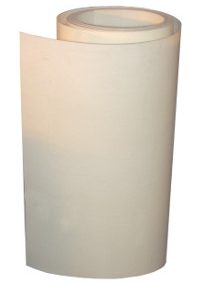
- polyesterfoil reinforced with glass fibre, white, 1,2mm thickness, roll 30m2, width 1m
- polyesterfoil reinforced with glass fibre, white, 1,5mm thickness, sand coated, roll 20m2, width 1m
- robust insulating plates providing appropriate mechanical and chemical resistance – do not crack when driving wedges
- cutting using a robust knife
- facilitated placement into gaps after cutting, especially in stone walls
- insulating plates do not move when driving wedges
Wedges
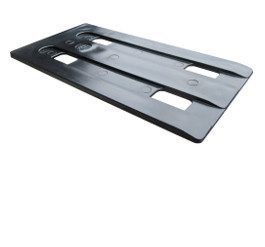
wedges 130x250mm, color black / gray, made of PC-PBT (stand static load of min. 500kg/cm2):
- 5mm thickness, box 160 pcs.
- 6mm thickness, box 140 pcs.
- 7mm thickness, box 115 pcs.
- 8mm thickness, box 100 pcs.
- 9mm thickness, box 85 pcs.
- 10mm thickness, box 80 pcs.
- 11mm thickness, box 70 pcs.
- 12mm thickness, box 65 pcs.
- 13mm thickness, box 60 pcs.
Concrete supplements
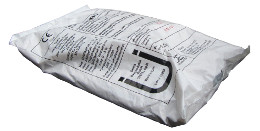
concrete supplements which causes mortar expansion while setting and increases fluidity while injection, which leads to easier fulfillment of voids in wall after cutting (package 0,5kg for 50kg of cement)
The insulating plates and wedges used in the technology have certificates confirming the appropriate chemical and mechanical resistance and guarantee full safety for the insulated building.
HDPE insulation plate
Insulation plates made of high density polyethylene (HDPE) are a modern and reliable solution used in construction and industry. HD polyethylene, thanks to its unique properties, is an ideal material for the production of insulation plates, which are characterized by exceptional durability and resistance to various external factors.
Properties of HDPE insulation plate
HD polyethylene insulation plates are characterized by high density, which gives them exceptional mechanical and chemical resistance. This makes them extremely durable and resistant to mechanical damage, even in difficult operating conditions. Additionally, this material shows excellent resistance to aggressive chemicals, making it ideal for use in demanding environments.
Key features and benefits
- Moisture and water resistance – HDPE insulation plates are an effective barrier against moisture penetration, making them irreplaceable in the insulation of foundations and underground parts of buildings.
- UV and temperature resistance – HDPE polyethylene is a material resistant to sunlight and extreme temperatures, which guarantees its durability in outdoor applications.
- Mechanical stability – insulation plates do not crack under load or when driving wedges, which ensures their reliability during installation.
- Flexibility and ease of processing – HDPE polyethylene allows easy cutting and adaptation of insulation plates to the requirements of a specific project.
- After matting the surface, easy and tight connection with REMMERS MB2K vertical insulation.
Glass fibre reinforced polyester insulation plates
Glass fibre reinforced polyester plates is an advanced insulating material that stands out for its exceptional durability and versatility of applications. It works particularly well in construction, where plates made of this material are used for effective waterproofing of buildings. Thanks to their unique properties, these plates provide long-term protection against moisture and other external factors, making them an irreplaceable element in modern insulation systems.
The offer includes various variants of plates of polyester foil reinforced with glass fibre, adapted to various design needs:
- 1,2 mm thick white insulation plate – available in 30 m² rolls and a width of 1 m. Ideal for applications requiring lightweight but effective insulation.
- 1,5 mm thick white insulation plate, coated – available in 20 m² rolls and a width of 1 m. Thanks to the additional coating, it provides even better protection against moisture and mechanical damage.
Advantages of glass fibre reinforced polyester insulation plates
- Resistance to damage – polyester insulation plates do not crack or deform during installation, even in difficult conditions.
- Rigidity and stability – the material retains its form during installation, which facilitates precise adjustment of insulation plates to the insulated area.
- Ease of processing – insulation plates can be cut to size using a diamond scriber, which allows for quick and precise adjustment to the design.
- Moisture protection – thanks to their advanced structure, insulation plates effectively block water penetration, protecting walls from damage resulting from long-term moisture.
- Resistance to chemical and atmospheric factors – the material is highly durable, even in the event of contact with chemical substances or extreme weather conditions.
- Ease of insertion / driving into stone walls, when cutting with a diamond wire.
The use of polyester insulation plates in building waterproofing
Glass fibre reinforced polyester insulation plates are used in both residential and industrial buildings. They are ideal for insulating foundations, basements, retaining walls or terraces. Their rigidity and ease of installation make them perfect for projects requiring precise placement of the material in gaps, e.g. in stone or mixed walls.
Choosing glass fibre reinforced polyester foil panels is an investment in the durability and reliability of building insulation, which translates into its long-term protection and savings on repair costs in the future.
PC-PBT wedges – support for insulation work
PRINZ Polska also offers wedges made of durable PC-PBT material. These accessories are essential when installing insulation, especially in the case of waterproofing systems that require precision and durability.
Properties of PC-PBT wedges
- Static load resistance – up to 500 kg/cm2.
- Chemical resistance – PC-PBT material ensures durability and reliability in difficult conditions.
- Precise fit – various thicknesses availability allow for perfect seating in gaps.
Variants and packing of insulation wedges
- 5mm thickness – box 160 pcs.
- 6mm thickness – box 140 pcs.
- 7mm thickness – box 115 pcs.
- 8mm thickness – box 100 pcs.
- 9mm thickness – box 85 pcs.
- 10mm thickness – box 80 pcs.
- 11mm thickness – box 70 pcs.
- 12mm thickness – box 65 pcs.
- 13mm thickness – box 60 pcs.
These wedges, thanks to their durability and precision, facilitate the installation of insulation plates, stabilizing them in place and ensuring the effectiveness of the waterproofing system. They are ideal for both new buildings and renovation work.
Cement mortar additive
An additive to cement mortar is a substance that significantly improves its properties during application. It causes the mortar to swell slightly during hardening, which ensures tight filling of gaps and cracks formed in the wall after cutting. Additionally, it increases the fluidity of the mortar during injection, facilitating its correct distribution even in hard-to-reach places. The recommended proportion is 0.5 kg of additive per 50 kg of cement, which ensures optimal efficiency and effectiveness in insulation and repair works.
Why choose PRINZ wall drainage technology?

Warranty
We provide 30-year warranty for our services.

Effectiveness
Our method guarantees 100% cut-off of capillary moisture – the problem does not return until the end of technical life of the building.

Versatility
The method can be used in most of the buildings, regardless of wall moisture level and thickness.
